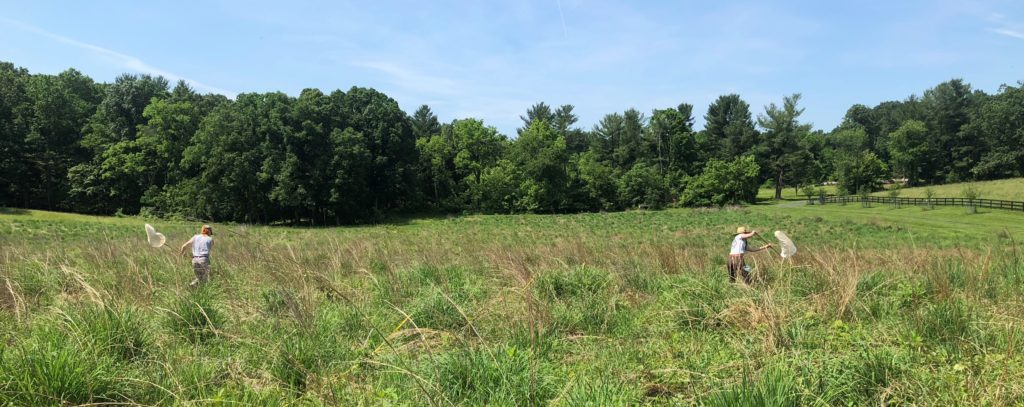
Arthropods are the most abundant and diverse group of animals on the planet, yet, we still don’t know enough about arthropods. Previous research has shown that arthropods are critical to the stability of terrestrial and freshwater ecosystems because they 1) pollinate almost two-thirds of all flowering plants, 2) decompose leaf litter and wood debris to form humus by, and 3) are key in the food web, linking plants with the larger consumers. We know little about how land management can influence these arthropod-mediated ecosystem services, especially in eastern grasslands.
Answering questions about arthropods can yield useful insights into how to manage land optimally for maintaining ecosystem function, or even inform captive management programs for threatened or endangered birds, like the Loggerhead Shrike.
To address these gaps in our understanding, VWL initiated a new research project in Spring 2018 in collaboration with NZP/SCBI Department of Nutrition Sciences, Smithsonian-Mason School of Conservation, and outside partners. This research will take place on local farms and will quantify how land management influences arthropod diversity and nutritional quality.
Project Goals:
- Collect data on arthropod abundance and diversity in native and non-native eastern grasslands
- Quantify the nutritional quality of arthropods from these habitats for application in ex-situ nutritional management
- Develop outreach materials highlighting the immense diversity of arthropods in Virginia’s grasslands and their importance in maintaining ecosystem function
- Expand collaborations between the NZP, SCBI, VWL, SMSC and the local community
By pursuing these research and outreach goals, we aim to better understand how land management influences arthropod diversity, highlight the importance of arthropod communities for supporting ecosystem function, contribute knowledge to inform nutritional management of Smithsonian’s ex-situ bird collection and further engage the local community on Virginia’s native biodiversity.
Collaborators and Primary Investigators:
Amy Johnson – Virginia Working Landscapes
Mike Maslanka – NZP/SCBI Dept of Nutritional Science
Jim McNeil & Stephanie Lessard-Pilon – Smithsonian-Mason School of Conservation
Alex Newhart – Shenandoah Chapter of the Virginia Master Naturalists
Funding:
2018 Friends of the National Zoo (FONZ) Conservation Grant
Project Timeline & Status:
2018 and 2019 Field seasons – completed
Related Resources:
Russel, K., Schoenemann, K., Power, M., Himschoot, E., McNeil, J., Davis, J., Newhart, A., Johnson, A. (2018) Influence of Grassland Type on Arthropod Biomass and Diversity. Poster presented at VWL Annual Meeting, March 2018.
SUPPORT VWL
VWL is supported 100% by grants and donations and our work is made possible by the generous contributions from our community.
The Smithsonian Institution is a 501(c)(3). All contributions are tax-deductible.
GET IN TOUCH
Virginia Working Landscapes
Smithsonian’s National Zoo and Conservation Biology Institute
1500 Remount Road, MRC 5537
Front Royal, Virginia 22630
SCBIVWL@si.edu
540-635-0035
